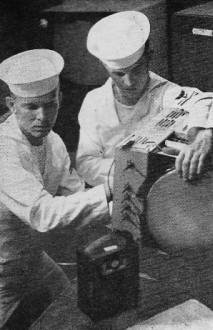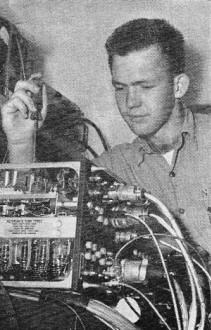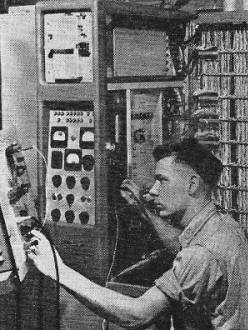|
March 1962 Radio-Electronics
 [Table of Contents] [Table of Contents]
Wax nostalgic about and learn from the history of early electronics.
See articles from Radio-Electronics,
published 1930-1988. All copyrights hereby acknowledged.
|
In the 1980s, when I
first entered into the civilian defense electronics contractor realm, I
discovered that while all companies preferred technicians with military
training, the U.S. Navy was considered tops for turning out qualified personnel.
My U.S. Air Force radar maintenance experience was also a definite advantage
when applying for employment at the Westinghouse Oceanic Division in Annapolis,
Maryland. At least half the guys (no girls back in the day) I worked with there
were former military. I don't recall any having been U.S. Army veterans, but
there was at least one U.S. Marine Corps dude. Most of the guys who had Top
Secret security clearances were veterans, probably because in those days in
order to get such a clearance you could not have any history of illicit drug use
(including pot), anti-American activity, homosexuality, amoral behavior, or even
tattoos. My own clearance level involved an extensive background investigation
where 3-letter-agency investigators questioned people all the way back to my
childhood neighborhood, and I was subject to a lie detector test (initially,
then yearly thereafter). I'm guessing that just about anything goes today
because of low recruitment numbers, and even high level politicians and
bureaucrats (many of whom are demonstrably of low intelligence and/or moral
character) get access to
sensitive compartmented information (SCI) which could cause grave damage if
compromised.
Electronic Careers in the Navy

Television is also on the Navy ET's job list. All photos
U.S. Navy
By G. Vern Blasdell
The Navy offers electronic training - the price is time in service.
If you want to get into the radio-electronics field, you may do well to consider
the possibility of permitting the US government to provide your training and experience.
You will have to pay, of course, but many who have preceded you have not found the
price excessive. The cost is primarily in time, not money.
Each of the armed services offers remarkable opportunities for anyone who is
strongly motivated, somewhat above the average in intelligence, and has the touch
as far as electronics is concerned.
The Navy is unique in this respect. It is starving for people in the field and
offers liberal inducements in the form of schooling, rapid advancement and proficiency
pay. The greatest need is for electronic technicians.
However, since electronics is widely used throughout the Navy, there are many
other jobs besides that of electronics technician (ET) in which electronics plays
an important part. Today, with the multitude of communication, radar, sonar, loran,
countermeasure and fire-control gear on every ship, naval base and naval air station,
almost every Navy man comes into contact with some kind of electronics. Fire-control
technicians, for example, swear they know more about electronics than the ET's.
Perhaps they do, but you won't find many ET's agreeing with them.
To give a picture of the range of training and experience offered, here is a
fairly detailed rundown of just what your rating as a Navy electronics technician
means:
You maintain and repair all electronic equipment on ships and stations, including
radio, radar and sonar gear used for communications, detection, ranging, recognition
and countermeasures. You use standard tools and testing devices to calibrate, tune
and adjust equipment.

Fire control station undergoing repairs.

Search radar is repaired aboard Navy plane while it is
airborne.

Computer-board circuit check aboard the USS Compass Island.
Jobs you could handle
Here is a list of the jobs you would be capable of performing:
• Draw and interpret schematic diagrams of simple electronic circuits and
interpret complicated electronic wiring and circuit diagrams.
• Operate and make necessary adjustments including shifting frequencies on radio
transmitters and receivers, direction finders, radioteletype, sonar, radar, infrared
and counter-measures equipment.
• Make major repairs on all standard naval types of radio, radar, sonar
and other electronic equipment.
• Analyze electronics equipment; test, isolate and replace defective parts.
• Maintain and repair motor generators used in electronics equipment power
supply systems.
• Make sensitivity, selectivity and accuracy measurements for electronic equipment.
Here Is What You Would Learn:
• Electronic theory including vacuum-tube and transistor characteristics,
power supplies, audio-and radio-frequency amplifiers, oscillators, timing, detection
and modulation circuits.
• Theory and application of electronic circuits in and technical maintenance
procedures for radio, radar and sonar systems and equipment.
• Direct and alternating current theory, effects of circuit components including
resistors, inductors and capacitors on flow of alternating and direct current.
• Theory and operation of electronic test equipment.
• Characteristics of ultra-high- and super-high-frequency circuits used
in radio and radar equipment and very-low-frequency circuits used in radio and sonar
equipment.
• Radio-wave propagation including effects of magnetic storms, sudden ionosphere
disturbances and seasonal and geographic factors.
• Function, theory, adjustment and repair of remote-control systems such
as selsyn and amplidyne.
• Principles of sound; effects of temperature, density and depth on propagation
of underwater sound.
• Procedures for operating, maintaining and repairing emergency and portable
power supply equipment.
• Transmission-line theory, methods of installation and procedures for maintenance
of transmission lines.
• Theory and operation of motors, generators, rectifiers and control circuits
in electronics equipment.
No one man, of course, becomes professionally familiar with all these areas.
In this age of specialization you, too, specialize. Roughly speaking, the Navy has
three areas of specialization for ET's:
1. Radar: primarily concerned with air and surface search radar, radar repeaters,
loran and identification equipment.
2. Communications: in which you concentrate on transmitters, receivers, and teletype
terminal equipment.
3. Sonar: which deals with searchlight and scanning sonar, fathometer, servo
and synchro mechanisms.
When you have completed your service obligation to the Navy (more about that
later), you can consider yourself well qualified as an electronic technician, radar
repairman, radiomechanic, radio repairman or electrical repairman. If you are bright
and aggressive, the Navy may pay your way through 4 years of college in one of the
science programs and you will end up in one of the engineering fields.
What You Will Do
Although the gear with which they work may vary somewhat from that of an electronic
technician, the actual job of a fire-control technician (FT) does not differ too
widely.
Briefly, here you will maintain and repair fire-control components and systems,
including fire-control radars and target designation equipment. You will make detailed
mechanical, electrical and electronic casualty analyses; make transmission, computing
and rate tests; align missile, gun and underwater fire-control systems.
Allied rates - or occupations - in the Navy which include a varying amount of
electronics work might include:
Sonarman - Maintains and operates electronic underwater sound
equipment used to detect the presence, direction and range of underwater and surface
craft as well as submerged objects. If you are interested in submarine duty (including
the new nuclear subs), you might consider this interesting avenue of approach.
Radarman - Does basic preventive maintenance, and operates electronic
radar equipment used in searching for and following movements of other ships and
aircraft, in navigation and maneuvering, in recognition and identification, and
in jamming the operation of enemy radars.
Radioman - The oldest rating in the field of electronics. He
also does basic preventive maintenance and operates radios, radio direction finders,
teletypewriters and similar gear. It is his job to keep this equipment in good working
order when technicians are not available - and they usually aren't.
Guided Missileman - Uses electronics to a great extent in checking,
testing, aligning, adjusting and repairing the Navy's guided missiles. He prepares
the missile for firing or launching and also is concerned with the technical maintenance
of the missile and its equipment.
Aviation Guided Missileman - Similar to that of the Guided Missileman,
except he concentrates on the Navy's air-launched missiles.
Aviation Fire-Control Technician - Acts in a capacity similar
to his earth-bound counterpart in his care and maintenance of aircraft electronic
fire control systems and components.
Aviation Electronics Technician - Concerned with airborne radio,
radar loran and radio altimeter equipment.
Navy schools
The gear with which you will work represents an investment of thousands of dollars,
and the Navy isn't about to let you poke blindly about with a screwdriver until
you know what you are doing. Navy technical schools have the reputation of being
the finest of their kind in the country.
As a rule, in addition to boot camp, the Navy maintains technical schools at
four distinct training levels.
Class-P schools are, so to speak, prep schools. The one in which you are interested
is located at Great Lakes, Ill., and offers a 16-week course covering basic electricity
and electronics. All students enrolled in this school have their orders to the next
higher level schools in these subjects: IC Electricians, Electricians Mates, Electronics
Technicians, Fire-Control Technicians, Radarmen.
Two class A schools are available for ET's. One at Great Lakes, Ill.; the other
at Treasure Island, San Francisco. Each offers three classes-a 26-week ET radar
class; and one each of 24 weeks on ET communications and ET sonar. To qualify, you
must possess a GCT + ARI (General Classification Test plus arithmetic) of 115 and
MECH or MK ELECT (mechanical or mechanical and electrical aptitude) of 40. Normal
color perception is required.

Checking out equipment in the navigation center.

Sonar maintenance class studying receiver repairs.
Here, you will learn as much math as you need for the course and, depending upon
which course you select or are assigned, you will receive instruction in the maintenance
and repair of search radar equipment, maintenance and repair of communications equipment
or maintenance and repair of sonar equipment. The training time spent in the class
P school mentioned above is included in the course length referred to.
The class B electronics technicians school is also located at San Francisco.
Courses last for 28 weeks and cover advanced electronic theory and maintenance problems.
Courses are open to ET2's and above or ET3's with 1 year's experience in rate in
an operational billet. You must be in your second enlistment to qualify.
Class C schools are located at Great Lakes and San Francisco. The length of the
courses range from 1 to 6 weeks. Each course covers instruction in the technical
maintenance and repair of a specific piece of ET equipment and is open to ET petty
officers.
In addition, there are innumerable Fleet Training schools to which you may be
assigned during your naval career, and you will receive on-the-job training until
you've reached a point where you're ready to drop.
One point to bear in mind - once you've signed on the dotted line and taken your
oath, you are obligated to stick to your bargain. You have promised to serve in
the Navy for 4 (or 6) years and you will be required to serve the full time, as
agreed, whether you like it or not.
Price of Training
You should also know that, although the Navy is quite willing to give you the
finest education in electronics possible, it expects something in return. For each
school that you attend, you will be obligated to serve a definite period of time
after you graduate from that school. If you don't have sufficient time remaining
in your enlistment, you will not be permitted to attend the more advanced schools.
Generally speaking, you must have 2 years' obligated service before you will
be permitted to attend a class - A school if the course is 20 weeks or less. (A
class A school provides the basic technical knowledge required to prepare for the
lower petty-officer rates.) If the A school runs from 21 to 40 weeks, you will be
required to serve 3 years.
Class B schools, which offer the advanced technical knowledge required to prepare
for the higher petty-officer rates, require 18 months' obligated service for a 20-week
or less course, 2 years for courses running from 21 to 40 weeks.
Class P schools have the same obligated service requirements as the class-A schools.
There are two ways of looking at the financial situation. No matter how simple
his job may be - grocery clerk, gas station attendant or clerk typist in an office
- if any of your friends is working for a living, he will tell you that the beginning
take-home pay offered by the Navy is ridiculously low. In this day and age of fairly
good wages, no man in his right mind would consider a starting salary of $78 a month.
On the other hand, no college, university or technical training school that we
know of will offer you room, board and clothing, plus spending money as inducements
to study with them. None will guarantee you a job after you've completed your studies.
The Navy will, and does.
Either viewpoint is correct, within limitations. Very briefly, here's the way
it works in the Navy. Basic pay when you enter the service is $78 per month, plus
allowances which include uniforms, food and quarters, dental and medical care. If
you're married, you also receive rent for your family.
At this time, you are in pay grade E-1 and, if you stay there for more than 4
months, your pay will be raised to $83.20. However, at the completion of your recruit
training, which is normally 11 weeks, you are eligible for promotion to the grade
of E-2, which pays $85.80 per month.
After 6 months as an E-2, or seaman apprentice, or 8 months total service, you
are eligible for advancement to E-3, which pays $99.37 per month. If, perish the
thought, you should remain in pay grade E-2 for 2 years or more, you will receive
$108 per month and, if at the end of 2 years you have the grade of E-3, your pay
will be $124 per month.
However, on the assumption that you're bright enough to earn a promotion as soon
as you have spent the minimum time in grade, you will be ready for the big jump
from seaman (pay grade E-3) to petty officer third class (pay grade E-4) after you
have spent 6 months as E-3 or a total of 14 months in the service. As an E-3, you
will have been preparing yourself for your specialty, whatever it may happen to
be, and undoubtedly will be going to school.
As an E-4, you will have definitely committed yourself in your occupation and
it will become increasingly difficult to change your rate. An E-4 receives $122.30
for the first 2 years, $150 for over 2 years, $160 for over 3 years. Further, as
soon as you reach E-4 status, you are eligible for proficiency pay, which amounts
to an additional $30 per month. However, you will undoubtedly progress to E-5 or
petty officer second class after you have served the minimum of 12 months as an
E-4. This pays $145.24 per month. (And don't forget to add to the figures your living
and the sundry other expenses paid for you by the Navy! It will boost the total.)
Two years of service as an E-5 is required for promotion to E-6, which pays $175.81
per month. We won't worry about further advancement, as you are very unlikely to
go any higher than E-6 during your first 4-year enlistment.
So there you are. Anyone of the points discussed above could be developed indefinitely,
but this is enough to give you some idea of what the Navy has to offer any young
man who is interested in a career in radio or electronics.
If you want to know more about it, see the man in the recruiting office nearest
your home. Watch yourself, however. As soon as he hears that you are interested
in and have some kind of background in electronics, he'll really turn on the sales
pitch.
Posted September 19, 2024
|













